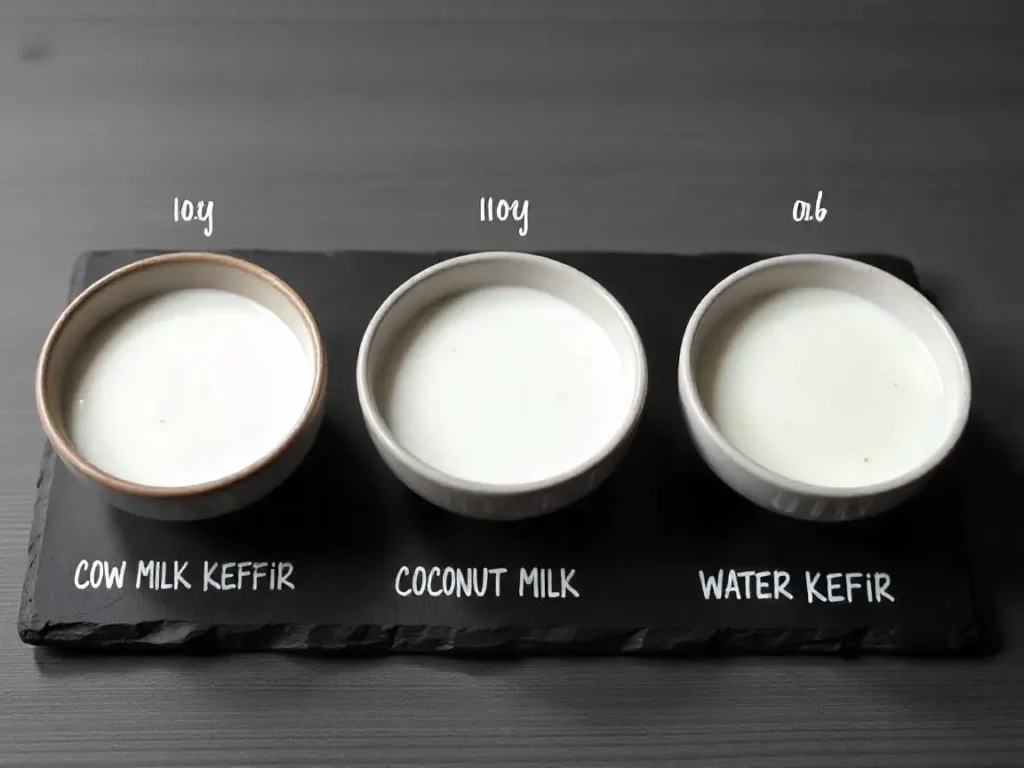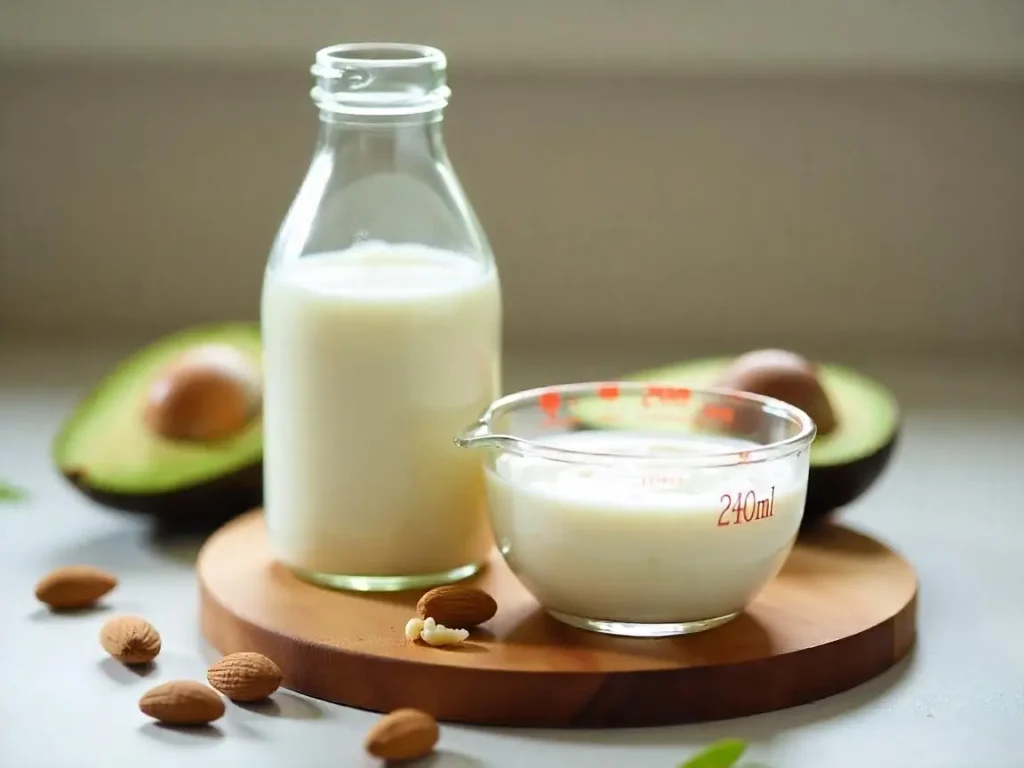On a keto diet, you must keep carb intake between 20g-50g per day to stay in ketosis. A plain, full-fat, 240 ml serving of Kefir has only 10 to 13 grams of carbohydrates, so it’s a low-carb, high-fat, keto-friendly and awesome drink that easily fits within your daily allowance without causing a big blood sugar spike. I discovered this at the supermarkets when I was aiming for the perfect macros on my Healthy Keto™ diet. The fermented dairy drink offers a yoghurt-like consistency and tangy flavor while delivering rich probiotic nutritious benefits to support gut health, sleep, and immune function.
Because fermentation breaks down most lactose, even a 50g portion or a 0.6 grams chunk of water, Kefir remains safe and incredible for those on a ketogenic diet, helping you limit carbohydrates yet enjoy different foods. You can also incorporate Kefir with a sweet, ZERO calorie, natural sweetener blend to keep each average serving under your daily carb limit, making it an ideal choice for your keto diet goal.
Table of Contents
Is Kefir Keto-Friendly?
When I first discovered kefir, that tangy fermented milk product that’s been around for centuries, I was skeptical about fitting it into my ketogenic lifestyle. As a fantastic food with a yoghurt-like consistency, this fermented beverage is similar to yogurt but with even more probiotic cultures that provide incredible nutritious benefits to support gut health, sleep, and immune function. For those on a keto diet who are aiming for ketosis, you need to be on the lookout for low-carb options. A standard 240 ml serving of plain, full-fat kefir contains about 10 to 13 grams of carbs, which can take up a significant chunk of your daily allowance of 20g-50g carbohydrates per day. The fermentation process reduces some lactose, which helps prevent blood sugar spikes, making it a relatively safe option for those looking to maintain stable glucose levels.

For keto dieters looking for new ways to add variety while staying low in sugar, kefir can be a perfect addition that keeps your meal plan interesting. While traditional milk kefir contains some carbs, coconut milk kefir is an excellent option for those seeking a vegan or non-dairy milk option that’s even lower in carbohydrates at about 0.6 grams per serving. I’ve discovered that enjoying kefir like yogurt or using it to make a kefir smoothie with a ZERO calorie natural sweetener blend creates delicious low-carb treats. Unlike other fermented food options such as Kombucha, which can be higher in sugar, kefir is typically high in protein and calcium, making it a superior option for achieving weight loss goals while dieting. If you’re lactose intolerant, consider drinking kefir as a non-dairy alternative or make your own kefir simply add a few tablespoons of kefir grains to milk, let it sit at room temperature overnight to ferment, or find kefir starter cultures easily online to begin experiencing this awesome drink that truly fits into a Healthy Keto™ diet when consumed in the right portion.
What Is Keto?
A low-carbohydrate diet called Keto is a metabolic state where the body uses ketones made from body fat for energy instead of glucose from sugar or carbohydrates . By cutting daily carbohydrates to 20 to 50 grams, the dietary shift forces the body into ketosis, so it burns fat for fuel rather than relying on high-carb foods like bread, pasta, or cereal .
Most experts recommend a ratio of about 70–75% fat, 20% protein, and 5–10% carbs making it a high-fat, moderate-protein, low-carbohydrate diet that can aid weight loss and help manage diabetes by lowering blood sugar levels . Tools like a keto calculator help you calculate how much to eat to stay in ketosis and limit carbs while enjoying fatty foods for energy instead of unhealthy, high-carb diet staples.
The Keto Diet Explained
The ketogenic diet, commonly known as the keto diet, is a low-carb, high-fat diet that has gained popularity for its potential weight loss and health benefits. This diet works by inducing a metabolic state called ketosis, where your body switches from using glucose as its primary fuel source to using ketones produced from fat. When you follow a keto diet, your body enters this state of ketosis, triggering profound effects on your body. One of the main benefits is its ability to promote weight loss by restricting carbohydrates so your body is forced to burn fat for fuel, leading to reduction in body weight and fat mass. Beyond weight loss, another benefit of the keto diet according to research is its positive effects on various health markers. Studies show it can improve insulin sensitivity and blood sugar control, making it a potential therapeutic option for individuals with type 2 diabetes or prediabetes.
The main principle of this approach is to minimize carbohydrate intake and increase fat consumption. By restricting carbohydrates, your body is forced to enter ketosis, promoting fat burning and weight loss. The diet consists of high-fat foods like meat, fish, eggs, nuts, seeds, and healthy oils while being low in carbohydrates from sources like grains, starchy vegetables, and sugar. When following the keto diet, it’s important to pay attention to the quality of fats you consume. Option for healthy fats from avocados, olive oil, and coconut oil which provide essential nutrients and are associated with health benefits. I’ve found that it’s crucial to avoid unhealthy fats like trans fats in processed foods that increase your risk of heart disease. Maintaining moderate protein intake is also essential, as excessive protein can interfere with ketosis. The diet recommends a moderate intake of protein, focusing on high-quality sources like grass-fed meat, wild-caught fish, and organic eggs. From my experience, including non-starchy vegetables like leafy greens, broccoli, cauliflower, and zucchini that are low in carbs but high in fiber makes for a great addition to meals while helping you feel full and satisfied.
Here’s the Nutritional Breakdown
When following a keto diet, I’ve learned that keeping an eye on carbs is the key to maintaining ketosis. Let’s do a breakdown of kefir’s nutritional profile to determine if it’s truly keto-friendly. A standard 240 ml serving of plain, full-fat kefir contains approximately 12g of carbs, which can be significant when incorporated into a meal plan. For most keto dieters who aim to stay below 20g-50g of carbohydrates per day, this single serving would consume a substantial portion of their carb allocation. In my experience tracking macros meticulously, I’ve found that this chunk of carbs might be worth spending if you value kefir’s probiotic benefits, but it requires careful planning around your other food choices to ensure you don’t exceed your daily allowance.
I’ve discovered that the timing of when you consume kefir can make a difference in how it affects your ketosis. Having it as part of a larger, balanced meal helps slow carbohydrate absorption, making it less likely to spike blood sugar levels. When I incorporate kefir into my keto diet, I typically reduce the portion size to half a serving (about 120ml), which brings the carb count to a more manageable 6g. This approach allows me to enjoy the nutritional benefits of kefir while still staying below my carb threshold. Remember that not all kefirs are created equal, always check labels, as some varieties, especially flavored ones, can contain significantly more carbs than the plain, full-fat version we’re discussing here.
Kefir and the Keto Diet
Let’s explore how kefir fits within the guidelines of the keto diet. The keto diet, short for ketogenic diet, is a low-carb, high-fat diet that has gained popularity for its potential benefits in weight loss and improved metabolic health. The main principle involves drastically reducing carbohydrate intake and replacing it with fat, forcing the body to enter a state of ketosis where it burns fat for fuel instead of carbohydrates. When following the keto diet, it’s important to carefully choose foods that are low in carbohydrates and high in healthy fats. This is where kefir comes into the picture. The carbohydrate content in kefir is derived from milk, but the fermentation process reduces the lactose content significantly, leaving a minimal amount of carbohydrates. An average cup of kefir contains approximately 10 grams of carbs, with sugar content varying by type and brand. For individuals following the keto diet and keeping carbohydrate intake low as crucial for maintaining ketosis, with a recommended daily carbohydrate limit that ranges from 20 to 50 grams, this relatively low carbohydrate content means kefir can be incorporated into a keto meal plan when consumed in moderation.

While the carbohydrate content may vary based on the specific type and brand (some kefir products may contain added sugars or flavorings that increase the carbohydrate content), it’s essential to read nutrition labels carefully and choose plain, unsweetened kefir to keep carbohydrate intake in check. Beyond the numbers, let’s consider the role of probiotics in keto. The probiotics found in kefir play a beneficial role in supporting overall health while following the keto diet. Research suggests they help reduce inflammation, enhance nutrient absorption, and support a healthy gut microbiome. The gut microbiome consists of trillions of microorganisms and plays a crucial role in various aspects of health including digestion, immune function, and mental health. Maintaining a healthy gut microbiome is particularly important when following the keto diet as the drastic reduction in carbohydrate intake can impact the balance of gut bacteria. By consuming kefir, which is rich in probiotics, individuals on the keto diet can support the diversity and abundance of beneficial gut bacteria, which contribute to improved digestion and nutrient utilization both essential for maintaining optimal health on the keto diet. Additionally, probiotics have shown anti-inflammatory effects that can be beneficial for individuals on the keto diet, which is already associated with a decrease in inflammation markers. The addition of probiotics from kefir may enhance this anti-inflammatory effect. I’ve found that incorporating kefir into my keto meal plan morning routine provides not only a delicious, nutritious beverage but also a reliable source of probiotics that support gut health and overall well-being.
Gut-Friendly Boost on Keto
The potential benefits of kefir for a keto plan show its compatibility with low-carb goals. From my own explore of dairy options, I love incorporating kefir into my keto routine because its high probiotic content makes it a valuable addition to the keto diet. It can support your digestive health by supplying beneficial bacteria that help promote a balanced gut microbiome, improving digestion, reducing risk of gastrointestinal discomfort and other conditions.
It’s important to factor in the keto diet’s high-fat nature, which can lead to digestive issues, so understanding kefir’s impact on ketosis is key. With minimal carbohydrates, its impact on ketosis is unlikely to be significant unless consumed in excessive amounts, so you should monitor your overall carbohydrate intake to stay within your daily limit. I’ve enjoyed staying in ketosis while enjoying kefir, but it’s essential to check the nutritional information of each specific brand and varieties that contain no added sugars or flavorings that might affect ketosis. For making kefir keto-friendly, following a keto diet, you can include it in your daily routine. Factors to consider when choosing the right kefir for keto include shopping tips: opt for plain, unsweetened varieties with the lowest carbohydrate content so they’re compatible with your keto diet. To add flavor, try blending keto-approved fruits, or sprinkle cinnamon or vanilla extract. If you’re feeling adventurous, try making homemade kefir using kefir grains and full-fat milk; preparing it yourself gives you control over ingredients and ensures it aligns with your keto goals. Homemade kefir is a cost-effective option to experiment with flavor variations by adding unsweetened cocoa powder or berries.
Customizing Kefir for Keto Success
In my experience, adding kefir to my daily routine on a keto diet boosts digestion, but you must weigh factors to consider at shopping time. Look for kefir that is plain, unsweetened, and free of added sugars or fancy flavorings across all varieties to hit the lowest carbohydrate content and stay compatible with your keto diet goals. Always check nutritional labels, choose plain options, and monitor overall carbohydrate intake to ensure it fits your keto goals without derailing staying in ketosis.
For added flavor and texture, try blending your kefir with keto-approved fruits, then sprinkle cinnamon or vanilla extract on top for a hint of sweetness. Personally, I love making kefir at home using kefir grains and full-fat milk, preparing small batches to control the ingredients and ensure each cup aligns with your keto goals. This cost-effective approach lets you experiment with different flavor variations, like adding unsweetened cocoa powder or berries, for a keto-friendly treat. Remember to enjoy in moderation as part of a well-balanced diet rich in beneficial probiotics and potential health benefits, making kefir a valuable addition to your keto routine by offering tangy goodness while staying in ketosis.
Low-Carb Kefir Choices
When you check labels, you’ll see that plain, unsweetened kefir has about 4g of carbs per quarter cup, while flavoured kefir or flavoured varieties often sneak in added sugars that can spike your carb count and pull you out of ketosis. To stay in the keto diet, pick low-carb alternatives and go full-fat or choose full fat for higher fat content to keep you fuller, for longer, harnessing the high-fat nature of kefir.
I often enjoy making a smoothie that combines keto ingredients like chia seeds, a few berries, or creamy avocado, mixing in half or small servings to fill you with the goodness of kefir while limiting carbs. A Dr friend taught me these tips: use unsweetened kefir in just a half serving or quarter cup, then layer in fats for a delish snack. This is the key to staying in ketosis and still enjoy the tangy texture without a carb spike.
Smart Keto Alternatives
When I’m choosing a keto-friendly drink, I first check the carb count to keep my carbs low. Almond milk kefir often comes lower in carbs than regular kefir and gives a nice probiotic boost without added sugar, making it one of my go-to fermented options that still packs protein and healthy fats.
For a creamier swap, I turn to coconut milk kefir, which compared to kefir made from cow’s milk is surprisingly low-sugar yet still high in probiotic benefits. Sometimes I stir in a spoonful of greek yoghurt or a dollop of flavoured greek yoghurt, and on days I want a non-dairy alternative, I reach for kombucha as another tasty alternative with a gentle probiotic boost.
Does kefir help you lose weight?
If you’re looking to lose weight with a simple approach, introducing kefir into your daily routine might be helpful. While not a magic ingredient for instant results, Kefir can be a valuable addition to any diet focused on reducing calories and carbs. As part of a balanced weight-loss strategy, kefir provides protein and healthy fats that keep you feeling full longer.

I’ve found that plain kefir offers the perfect sweet hit with only about 6 calories per serve, containing no sugar and typically less than 1g of carbohydrates per ounce. This makes it delicious yet ketogenic-friendly compared to yogurt. You can enhance the flavor with natural sweeteners like stevia or monk fruit without affecting its low-carb benefits. When I was following a strict keto diet, I relied on kefir as my morning protein source, and it helped me maintain ketosis while providing essential probiotics that may support metabolism and gut health.
Low-Carb Living with Kefir Milk
I love using kefir milk in my keto cooking because it acts as a creamy base for soups, smoothies, and salad dressings while keeping carb counts low. One cup of plain, whole-milk kefir contains about 10 to 13 grams of carbohydrates, which can fit into most low-carb plans when portioned correctly. This versatile ingredient also delivers high-quality protein, healthy fats, and probiotics that support digestion and overall health on a ketogenic diet. For even fewer carbs, water kefir offers less than 1 gram of carbohydrates per serving, making it a smart swap when you need to reduce carbs further.
Using kefir as a substitute for sour cream or yogurt in recipes can help manage cravings by adding a tangy flavor without extra carbs or sugar. I often blend kefir with spinach and avocado or mix it into cauliflower mash to replace higher-carb foods, keeping meals satisfying. The probiotics in kefir can improve gut health, which may help curb snack urges and support low-carb living over time. Pairing kefir with nuts, seeds, or low-carb fruits adds texture and extra fat to your meal, making it a filling component of your daily keto routine.
Is Kefir Good for Keto?
When I faced the question of whether Kefir is good for the keto diet, I found the answer lies in the balance: a full cup can be high on the carb side, making it tricky to fit a large portion into your daily carb intake if you’re aiming to stay under 50g per day. Fermentation reduces some lactose, but carbs are still present, so portion control is key.
Personally, I found a small half-cup serving mainly can help avoid a spike in blood sugar, making Kefir perfect as a low-carb snack. Tracking the lactose still present after fermentation gave me clarity to fit it into my keto plan.
How to make keto kefir?
These three keto kefir recipes you can make at home or prepare easily: the coconut milk keto-friendly kefir recipe, full-fat milk keto-friendly kefir recipe, and keto-friendly water kefir recipe. For the coconut milk keto-friendly kefir recipe (time: 1 to 2 days/24 to 48 hours, servings: per serving: ½ cup, calories, protein, carbohydrates, fat; ingredients: coconut milk, kefir sachet starter; directions: mix and combine, pour into a large jar, cover loosely with cheesecloth or a clean kitchen towel, leave at room temperature (72 to 86 degrees F, 22 to 30 degrees C) for the ferment, then strain with kefir grains, pour the milk kefir into an air-tight container, shake, enjoy, and store leftover coconut milk kefir in the fridge up to 30 days; tip: add low-carb sweeteners like stevia or sucralose, vanilla extract, cocoa, or cinnamon powder to boost sweetness and flavor. For the full-fat milk keto-friendly kefir recipe (time: 3 days, servings: per serving: cup, calories, protein, carbohydrates, fat; ingredients: kefir grains, full-fat milk; directions: put kefir grains in a glass container, pour milk, stir and combine, cover loosely with cheesecloth or a clean kitchen towel, ferment at room temperature (72 to 86 degrees F, 22 to 30 degrees C) for 12 to 36 hours during which the fermentation process is done when it smells sour, the consistency is slightly thick and you notice the whey separate from the milk, then strain the kefir grains, pour the milk kefir into an air-tight container, shake, enjoy, and store leftover milk kefir in the fridge up to 30 days; tips: avoid warming or heating to not kill microorganisms, and cold kefir is better. For the keto-friendly water kefir recipe (time: 2 to 3 days, servings: per serving: cup, calories, protein, carbohydrates, fat; ingredients: sugar, organic, water, chlorine-free water, kefir grains; directions: add sugar to chlorine-free water in a jar, stir thoroughly, add kefir grains to the sugar water mixture, cover the jar loosely with cheesecloth or a clean kitchen towel, ferment at room temperature (72 to 86 degrees F, 22 to 30 degrees C) for 2 to 3 days, strain the kefir grains, pour the water kefir into an air-tight container, shake, enjoy, and store leftover water kefir in the fridge up to 30 days.

I’ve found that keto kefir can fit a ketogenic diet if you track calories, protein, carbohydrates, and fat. A ½ cup serving typically has around 100 calories, 4 g protein, 3 g net carbs, and 5 g fat, especially when made with full-fat milk or coconut milk. Fermenting at room temperature (72 to 86 degrees F, 22 to 30 degrees C) helps reduce sugars, and using cold kefir straight from the fridge balances macros. My personal note: letting it rest for a full 3 days boosts creaminess, but be careful not to overstep those hours to avoid too sour a taste.
Is Kefir Healthy?
Kefir is incredibly healthy and full of essential nutrients and vitamins that support overall wellness beyond just being keto-friendly. As a fermented dairy product filled with live bacteria, it’s one of the best sources of probiotics available, containing up to 56 different bacterial and yeast strains working together. I’ve personally noticed improved digestion since making it a great addition to my daily diet. These probiotics are the good guys that help our bodies maintain balance between good and bad bacteria in our gut.
What makes kefir truly exceptional is how these microorganisms help us digest food more efficiently and create important vitamins like B12 and K2 that many people lack. Recent studies suggest that regular kefir consumption may improve metabolic health by regulating blood sugar and reducing inflammation. I was skeptical about the tangy taste at first, but after incorporating it into my morning routine for several months, I’ve experienced fewer digestive issues and more consistent energy levels. Unlike some fermented foods that offer limited benefits, kefir provides a comprehensive package of nutrition that supports immune function while remaining low in carbohydrates.
Can You Have Kefir on the Healthy Keto Diet?
Kefir is generally safe on a Healthy Keto diet, but you need to be careful about your daily carb limit. A single cup of traditional whole-milk kefir contains approximately 10 to 13 grams of carbs, which might represent a substantial portion of your allowance. I typically recommend limiting to one serving per day if you’re strictly monitoring carb intake. However, alternatives like water kefir offer fewer carbs than whole milk or coconut milk varieties, making them more suitable for those on stricter plans.

For the most keto-friendly option, a small serving of water kefir contains less than one gram of carbs, making it an excellent choice that won’t significantly impact your daily macros. In my experience coaching keto clients, those who incorporate fermented foods like kefir often report better digestion and adherence to their ketogenic lifestyle. The probiotic benefits support gut health while keeping carb counts manageable. When selecting kefir products, always check nutrition labels as carb content can vary significantly between brands and types.
What Else Is Kefir Good For?
Kefir is far from just a tasty treat for those on ketogenic diets. The powerful probiotics in this fermented drink are linked to numerous health benefits that I’ve personally experienced. After drinking it regularly for months, I noticed significant improvements in my seasonal allergy symptoms that previously required medication. These same beneficial bacteria are known for boosting the immune system, potentially improving both asthma symptoms and digestive health. Many people report using kefir for treating stubborn yeast infections and candida overgrowth, as its active cultures help restore gut balance.
Beyond digestive support, researchers are investigating kefir’s potential for fighting abnormal cells, including cancer cells, though more studies are needed to confirm these scientifically proven benefits. I’ve been discovering more amazing uses for kefir, including applying it topically to skin troubles like eczema. The lactic acid and beneficial organisms seem to relieve inflammation and accelerate healing. While it can’t cure every condition, kefir has helped me manage symptoms of indigestion that prescription medications couldn’t touch. The mental clarity and energy boost I experience from regular consumption are unexpected bonuses that make kefir a permanent addition to my wellness routine.
Conclusion
Kefir can fit into a ketogenic plan when you choose plain, unsweetened varieties and keep portions moderate, offering a boost of probiotics and nutrients without kicking you out of ketosis. To make it work, blend a small amount into smoothies or enjoy it as a low-carb snack alongside high-fat foods, so you get the benefits of live bacteria while managing carbs. Remember, balancing vitamins, minerals, and healthy fats is key, so track your macros and listen to your body’s signals. Feel free to experiment with different serving sizes and timings to see what keeps you in ketosis and feeling your best. You might just discover that a daily glass of kefir is your new keto secret weapon!
FAQs
Is plain, full-fat kefir keto-friendly?
Yes! A 240 ml glass has about 10–13 g carbs, so by keeping portions small like 120 ml you stay well within the 20–50 g daily limit while still enjoying its creamy, tangy goodness.
Which kefir varieties are lowest in carbs?
Water kefir and coconut-milk kefir shine here, often clocking in under 1 g and around 0.6 g of carbs per serving, making them perfect for stricter keto days.
How do I fit kefir into my keto macros?
I love blending half-serves into smoothies with MCT oil or chia seeds, or pairing it with avocado and nuts. This balances fat and protein so the carbs don’t tip me out of ketosis.
Does fermentation really cut down sugars?
Absolutely. The kefir grains feed on lactose, breaking it down into lactic acid, which means fewer carbs, gentler blood-sugar responses, and more live probiotics.
Can kefir boost gut health on keto?
Definitely. Those live bacteria help crowd out the “bad” bugs, support digestion, and even aid in creating important vitamins a great edge when you’re running low on fibrous carbs.

Hi, I’m Natalia Smith, a kefir enthusiast and content writer dedicated to making fermented dairy approachable and enjoyable. My journey with kefir began in my own kitchen, experimenting with recipes and sharing the health benefits I discovered. Through hands-on experience and continuous learning, I aim to provide clear, trustworthy information that helps others embrace the goodness of kefir in their daily lives.

Pingback: Keto Diet Plan for Beginners Step by Step Guide